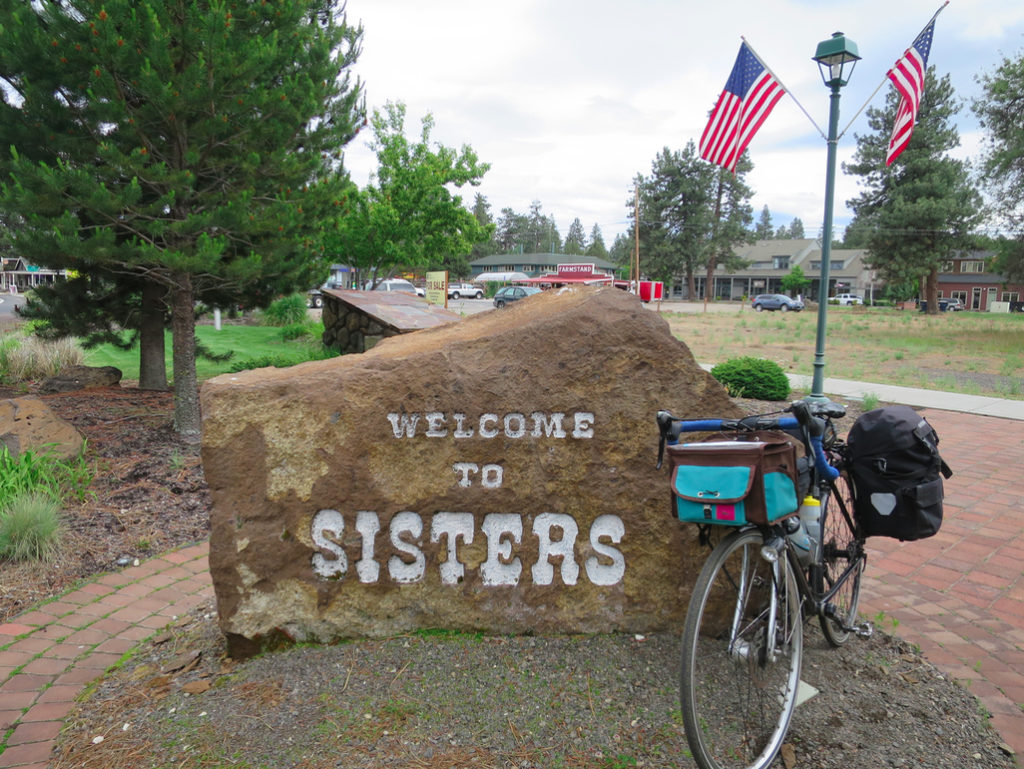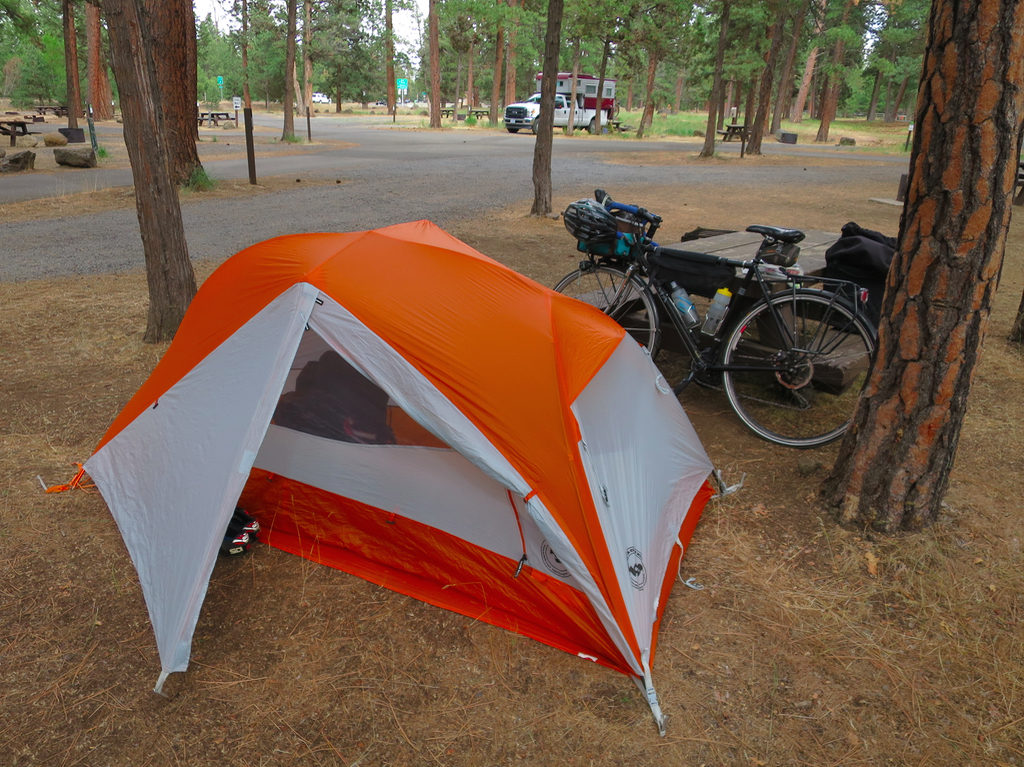The city of Sisters, OR is not particularly close to Portland, especially for someone with no car, yet somehow I find myself there on my bike an awful lot. Perhaps because it’s just on the other side of McKenzie Pass (definitely my favorite way over the Cascade mountains), but it often seems like the best way to cross to the east side of the state or come back home.
 (it’s also just super cute and I love it, so I might unintentionally create ways to go through it even if I don’t have to)
(it’s also just super cute and I love it, so I might unintentionally create ways to go through it even if I don’t have to)
There’s also a city-run campground right in town, which I love because you can set up your tent and then walk over to dinner, or to the grocery store, or the post office, or whatever it is you happen to need for that point of your bike tour.
Sadly, being a city campground, there has never been a hiker/biker site, which means that 1) if you show up on a bike, you’re competing with everyone who drove there and got there much faster and earlier than you, and 2) even though you only take up about 8 square feet of room, you still have to pay the full price for a campsite with a parking spot and all sorts of space you don’t need and that someone else could be using.
This time I was in Sisters, though, I was excited to discover they’ve added a hiker/biker site, right next to the creek!
 (super cute! And so nicely labeled!)
(super cute! And so nicely labeled!)
When I tried to use it though, by registering with the campground host as they ask you to do, the hostess told me that it wasn’t available to me because I wasn’t biking across the country. Those sites are for cross-country tourists, she told me, on the cross-country route that goes through Sisters. Since I’d just come from Portland, I didn’t qualify.
What?
I’m usually particularly averse to confrontation (though it’s something I’m working on!:), but this was too ridiculous to let go.
“So, how do you know if someone’s biking across the country?” I asked her. “How can you tell that they’re not just riding from Montana to Eugene or something?”
Of course she had no answer for that, but reiterated that those were the rules as she understood them. When I asked her to see the hiker/biker policy so that I could see if I understood it the same way, she didn’t have it, but she did give me a phone number so that I could call the Sisters City Hall. “Call Julie,” she said. Julie would be able to explain the policy to me.
It was evening, though, and City Hall was closed, so I just settled into my “regular” campsite, complete with unused parking spot and surrounded by RVs, and called it good.
 (so much more space than I needed!)
(so much more space than I needed!)
The next morning, though, I definitely called Julie — who burst into laughter when I told her what happened. “Oh goodness no,” she said. “That’s not our intent.” The hiker/biker site is first-come-first-serve, limited to a two-night stay, and is, indeed, for people traveling anywhere by bike. She apologized profusely, refunded my campsite fee, and said she would talk to the hostess.
So I was glad to discover I wasn’t the wrong kind of bike tourist after all.
But it did make me realize that the concept of “bike travel” is definitely still a foreign one to many. To the campground hostess, a bike tourist (and thus someone eligible to use the hiker/biker site — who knows what constitutes the “hiker” part…) was someone on a specific fixed route, doing some sort of plainly-demarcated feat of fitness, a bike-across-the-country physical test. The idea that someone might travel by bike the way one might travel by car, going to whatever places seem interesting simply because a bike is a good way to travel, clearly had not occurred to her. So I’m glad that I could push her thinking there a little and be an example of an alternate kind of bike traveler, one who travels not necessarily to follow a set route but to go to places I want to go.
(And I do believe I did it in a nice way, so hopefully even though we disagreed she still thinks bike tourists are nice people:)
I hope that other people traveling by bike will now benefit from her expanded understanding;) And yay for the city of Sisters for finally implementing a hiker/biker site and rolling with the initial misunderstandings of how it’s supposed to be used.

Yay! Bravo pour une confrontation qui était non-confrontationnelle! :-)
:) merci! I can do it! heh.
If you didn’t know, you can also camp just about anywhere in the woods just west of Sisters proper. This is Deschutes NF land and allows dispersed camping. While Mia and I were down there Memorial Day weekend we rode the “Sisters Trail” which is crisscrossed with all the NF roads in there. There were at least 6 campers boondocking in there.
The problem with that area is water… unless there’s a stream somewhere I don’t know about? Unless I’m packing a whole bunch of water already, I’d much rather camp where I can filter some more and I always just sort of assumed there wasn’t any there — but that being said, I haven’t explored it the way you have. Is there water? Cuz that would be a great thing to know:)
Water is probably a big issue. Especially in the summer months. While we were riding it was very dusty and dry. We did stumble upon one area that looks like it may be a seasonal swimming hole, but in late May it was already drying up.
True that you can “free camp” in a lot of National Forest land. But I think the big benefit with the “in town” campsite as Stasia mentions is the availability to amenities. Sometimes I want to camp in a wildernessy area, sometimes I want to end my day a stone’s throw from restaurants and grocery stores.
Exactly:) AND showers! :)
Thanks for the post and the informative response. Hoping to camp there sometime this summer.
Awesome! Have a good trip over there! If you’re on a bike, I hope they’ve figured out the hiker/biker site for you for realz:)
Pingback: Can a long bike tour change you, and what kind of bike tourist are you? – Urban Adventure League